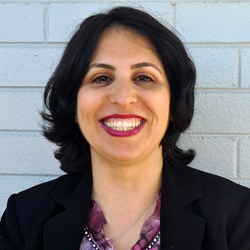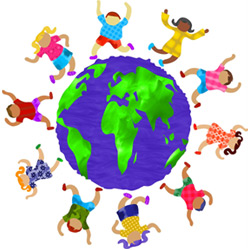
Promoting diversity in early childhood education
Today, almost half (48.2%) of Australians have a parent born overseas. With this increasing multicultural diversity, it is more important than ever that we are preparing our children to recognise diversity, and respect and appreciate difference.
Early childhood education can play a leading role in facilitating this recognition and respect. This is because a child’s social and cultural environment, both at home and in their early childhood setting, influences their learning and development. Experiences in early childhood have lifelong impacts on learning.
The Queensland kindergarten learning guideline (QKLG) emphasises the necessity of promoting cultural competence in perspective, principle and practices, including to ‘make curriculum decisions that respect and include children’s diverse ways of being and knowing, social and cultural experiences, geographic locations, abilities and needs’ (p. 3). Other national early childhood frameworks make similar recommendations.
A child’s social and cultural environment, both at home and in their early childhood setting, influences their learning and development.
However, in my research (Ba Akhlagh 2021 a & b) I found that not all Australian early childhood teachers feel confident promoting cultural diversity in their classrooms. I quite often hear teachers say ‘I don’t have any culture’. It is important to consider how knowledge and understanding of own and others’ cultures may affect teachers’ confidence in responding to diversity. Culture is about the behaviour and attitudes that shape us. If teachers are aware of these influences, they can promote respectful learning about different ways of knowing and being. Through critical reflection, unhelpful unconscious biases that hinder acceptance of cultural diversity may be identified.
The following considerations can support teachers to reflect on their cultural understandings and practices in promoting QKLG respect for diversity learning.
Being guided by the children
The QKLG guides teachers to view children as diverse learners who are competent and have agency in their decision-making (p. 1). Teachers can be guided by children to promote different cultures in their classroom through open-ended activities. In my PhD research, I found children are often taught particular ways to paint, draw or make something. But their ideas of creativity may be very different, based on what they do at home. Allowing them the freedom to take control of their creative practice is one important way of encouraging young children to be proud of their cultural differences and to share their ideas with others in the classroom.
Celebrating events
Every year my family celebrates Persian New Year in spring, and I have had the opportunity to visit a local school and share some of the activities and traditions that this involves. Finding out about and celebrating the cultural events of families and staff attending the service is a great way to encourage respect for different cultures.
Setting up the classroom
The classroom can be a welcoming and culturally safe space for all children and reflect the diversity in the classroom through books, posters and pictures without any special labelling. One great classroom activity could be to display a map of the world and invite families to share a photo and pin it on the map to show where they are from.

Partnering with families and communities
There is a wealth of knowledge from many different cultures in our families and communities. Teachers can improve children’s exposure to different cultures by inviting families to share drawings, pictures, stories and cuisines from their culture, and by inviting community groups to the classroom to share aspects of their culture.
Understanding language matters
Teachers can use positive language, celebrate differences and respond openly and honestly to children’s questions. They should also challenge ideas and viewpoints that are biased and discriminatory, and offer alternatives that support and respect diversity.
Confronting your own biases
It is important early childhood teachers engage in critical reflection and identify their own unconscious biases in order to effectively encourage cultural diversity in the classroom. There are many resources available on anti-bias approaches in early childhood that can support reflection on bias and equity in practice and planning.
Resources include:
- Understanding Anti-bias education: Bringing the four core goals to every facet of your curriculum by Louise Derman-Sparks and Julie Olsen Edwards (www.naeyc.org/resources/pubs/yc/nov2019/understanding-anti-bias)
- Early Childhood Australia Learning Hub module Anti-bias approaches in early childhood (https://learninghub.earlychildhoodaustralia.org.au/elearning/anti-bias-approaches-early-childhood)
- The Anti-Bias Approach in Early Childhood (4th edition), edited by Red Ruby Scarlet 2020.
Reflection
- How is each child’s individuality and agency supported in the kindergarten program?
- What do I understand about the cultural and linguistic identity of the children and families I work with?
- How are children’s diverse ways of being and knowing used to inform planning and assessment?
- What do I know about my use of respectful language and interactions, personal beliefs and potential bias, and cultural responsiveness?
This article is also available as a PDF.
Reference list
Abacioglu, CS, Fischer, AH, & Volman, M 2022, ‘Professional development in multicultural education: What can we learn from the Australian context?’ Teaching and Teacher Education, Vol. 114, June 2022, 103701, https://doi.org/10.1016/j.tate.2022.103701.
Ba Akhlagh, S 2021a, Early childhood national educational frameworks and teachers' beliefs about creativity: a comparative study of Australia and Iran [Doctoral dissertation, Newcastle], http://hdl.handle.net/1959.13/1427296.
Ba Akhlagh, S 2021b, ‘Early Childhood Sociology of Education: A case of Cultural Diversity in Australia’ in M. Aydoğmuş (ed), New Trends and Promising Directions in Modern Education New Perspectives 2021, Palet Yayinlari, pp. 74–88.
Mokrzycki, S 2020, ‘Eight Australian picture books that celebrate family diversity’, The Conversation, https://theconversation.com/eight-australian-picture-books-that-celebrate-family-diversity-109429.
Bahr, J ‘Census 2021: Almost half of Australians had a parent born overseas’, SBS News, https://www.sbs.com.au/news/article/census-2021-almost-half-of-australians-had-a-parent-born-overseas/5r9mi7esi.


